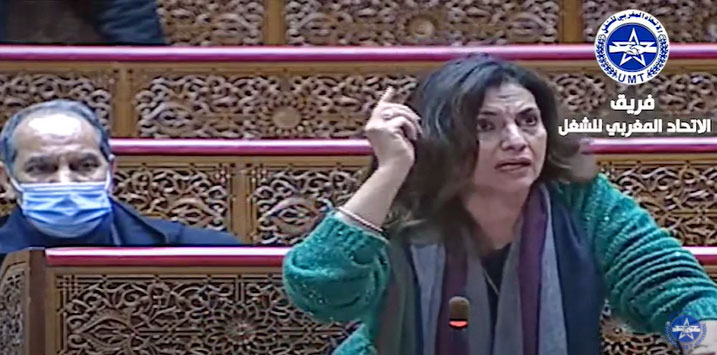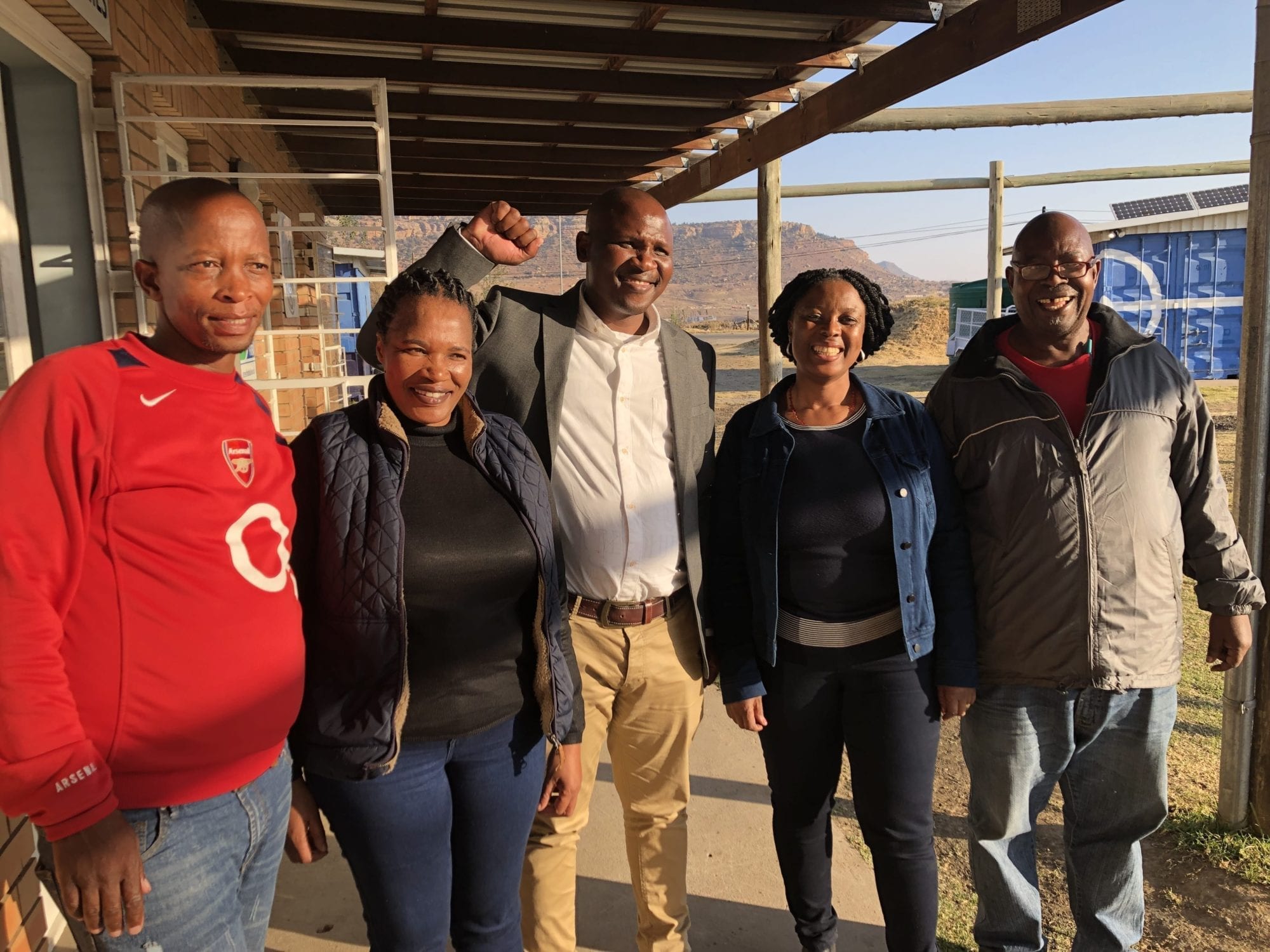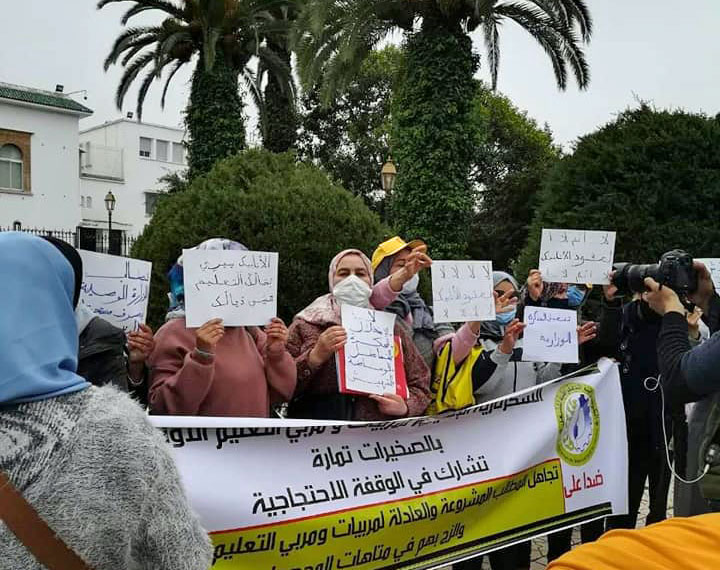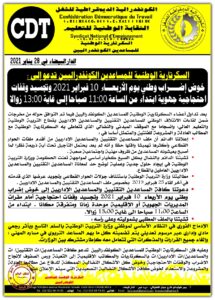Feb 18, 2021
“The accident took place earlier this month, in a factory that employs 130 workers, mostly women. The illegal factory is said to have been operating for 20 years. Labor groups including U.S.-based Solidarity Center, are campaigning for an investigation into the tragedy.”

Feb 11, 2021
A 14-year old girl was among the 28 garment workers killed in a factory disaster in Tangier, Morocco, this week. Her mother says she had worked at the factory, an illegal sweatshop, for three years.
The workers were drowned or electrocuted after a flood caused a short circuit. Seventeen others were injured. The facility operated in an underground garage in a residential area with 130 workers, most of them women. A nearby resident rescued some of the workers by throwing a rope into the flooded factory.
“How could this factory have been a secret? Where were the labor inspectors? Where were the local government authorities? Where were the investors?” asked Amal El Amri, a representative in Morocco’s upper house of Parliament and Moroccan Labor Union (UMT) member.
Residents in the area say the sweatshop operated for more than 20 years.
“We must ensure a voice for these workers who have died, and for the many thousands more women workers who toil under the same dangerous conditions,” El Amri said. In January, a fire at another illegal textile factory in Tangier injured one person and destroyed the factory, where 400 people worked.
The UMT and Democratic Labor Confederation (CDT), both Solidarity Center partners, demanded an immediate investigation into the tragedy, and the CDT said in a statement that it holds the state, the government and the employers fully responsible for the workers’ deaths.
Fast Fashion Industry Spawns Illegal Factories
Across from Spain on Morocco’s northern coast, Tangier is a key hub of Morocco’s textile manufacturing. Countrywide, official statistics show 1,200 textile companies with 165,000 workers—27 percent of the country’s industrial employment.
Yet many factories in Morocco’s textile and leather industry—estimates range in the thousands—operate illegally, forcing workers to labor long hours for low pay in often dangerous conditions. A 2012 investigation revealed that workers in illegal Moroccan textile sweatshops work, on average, 55 to 65 hours per week—11 to 21 hours more than the legal limit.
Operating outside national labor laws or standards, illegal factories are a direct response to the demands of the fast fashion industry, in which large brands demand quick response to fashion changes and customer demands and so draw on subcontractors whose workforce is cheaper and its work arrangements informal.
With no job stability and few social protections, garment workers in the informal economy are subject to exploitation and abuse, with no health coverage, pensions or other social and legal protections. Some one-third of Morocco workers are in the informal economy, which accounts for 14 percent of the country’s gross domestic product.
‘Companies Must Be Held Accountable’
As the global labor movement joins in calls for accountability in a supply chain where workers pay the price for cheap production, the Morocco Contribution Forum is urging the government to close all workplaces without health and safety protections and establish a policy to ensure severe penalties for companies operating outside the law.
Public officials must “improve the rights and living standard of marginalized people who are victims of oppression and violence, whether it is on the way to work, or in the workplace, and to provide them with the minimum conditions of human rights,” the Forum, a Solidarity Center partner, said in a statement.
Feb 8, 2021
In a boost for Ukraine’s anti-corruption efforts and worker rights, Olena Bebeshko, leader of the Independent Trade Union of Aviation Workers of Ukraine at the VIP terminal at Kyiv’s Boryspil International Airport, won a landmark legal victory last week. An appeals court affirmed a 2021 lower court decision that—under whistleblower-protection rules—Bebeshko had been illegally fired in retaliation for reporting widespread corruption at the terminal.
The court ordered immediate reinstatement, at full pay, and awarded her $5,300 compensation.
“This case is a milestone for labor rights protections and combating large scale corruption,” said Independent Aviation Workers Union of Ukraine President Veniamin Tymoshenko.
After reporting corruption at the terminal to Ukraine’s National Anticorruption Bureau, Bebeshko and other terminal workers suffered harassment and violent attacks. For example, a mother of two, Natalia Zhulinska, was fired after refusing to ignore improper activities and almost entirely blinded in a 2017 acid attack. Before that, her car was destroyed by fire, with explosives and weapons planted inside to frame her for the attempt on her life, says her union.
Bebeshko was fired in 2021 after directing corruption allegations from the union to the National Anticorruption Bureau. Although a lower court ordered that she be reinstated immediately, she was denied admittance to her workplace and her pay cut by one-third during the appeals process.
The court decision has advanced the country’s fight for whistleblower rights and against corruption. Bebeshko is of one of very few workers to have won official whistleblower status in Ukraine, despite new legislation that provides whistleblowers with added protections, especially as applied to labor rights.
Transparency International in 2020 ranked Ukraine 122 out of 181 countries in relative degree of corruption. The “Solidarity Against Corruption” campaign—a broad alliance of civil society members including unions and Solidarity Center partner Labor Initiatives (LI)—aims to improve legal protections for workplace rights, whistleblowers and freedom of association in Ukraine.
Workers at the Boryspil airport VIP terminal began reporting rampant corruption in 2014 after new management took over following a change of government. Loyalists willing to engage in, or facilitate, corruption allegedly retained their jobs while 50 workers were laid off and their positions turned over to new managers’ friends and family. The goal, the union says, was to ensure that only those willing to ignore or support management skimming of airport funds—among other corrupt practices—worked the terminal. Terminal workers the following year organized and affiliated to the Ukrainian Independent Trade Union of Aviation Workers of Ukraine to collectively protect their jobs, and the public, from corrupt practices at the terminal.

Feb 8, 2021
A worker-centered, precedent-setting program that targets gender-based violence and harassment (GBVH) in four Lesotho garment factories is now in effect for as many as 10,000 workers producing jeans for the global market.
The program inauguration on Friday was marked by a social media campaign, including SMS text blasts to garment workers, Lesotho-based media coverage and a video announcement by signatories to binding 2019 agreements—the factory owner, brands, local unions and women’s rights groups, and international organizations and unions, including the Solidarity Center, Workers United, and the Worker Rights Consortium. The program, which is unique in that it is binding and worker-led, will empower Lesotho unions, human and women’s rights groups to effectively address GBVH. One of its tools is a new Solidarity Center GBVH training video in English and Sesotho, which debuted on Friday, that will be widely disseminated to garment workers during training programs and via social media.
To combat widespread abuse, the program is providing garment workers with GBVH awareness trainings, a confidential reporting system and enforcement processes administered by an entity independent of employer influence. Under the program:
- Workers’ Rights Watch, an independent Lesotho-based nonprofit entity established by the agreements, is fully empowered to investigate complaints of GBVH and determine remedies to redress violations of the agreements’ GBVH code of conduct.
- A confidential, toll-free information line run by one of the women’s rights organizations is available six days a week for garment workers to discuss GBVH issues and remedies with trained counselors, including determining their rights under the code of conduct and how to participate safely in a complaint and remedy process.
- Education and awareness campaigns and programs are being provided to garment workers and their supervisors that get at the root causes of gender discrimination and violence against women, outline the GBVH code of conduct and remedies under the program, and encourage reporting through the information line.
“Painful occurrences have been happening at our place of work,” said Nien Hsing shopfloor union representative ‘Mamoleboheng Mopooane, describing demands by supervisors for sexual favors from workers seeking employment at the factory gate in exchange for work in previous years.
“We are really grateful for this program because before it has even [officially] started, we can see that there are already existing successes,” she said, adding that the program will be of even greater assistance once workers know where to report violence and harassment, and can see that GBVH incidents are taken seriously.
Program partners include Lesotho-based unions and women’s rights groups that will play a key role in implementing the program to ensure that the binding agreements change the culture and practice at Nien Hsing’s factories and provide remedy for victims of GBVH. These include the Federation of Women Lawyers in Lesotho (FIDA), the Independent Democratic Union of Lesotho (IDUL), the National Clothing Textile and Allied Workers Union, Lesotho (NACTWU), the United Textile Employees (UNITE) and Women and Law in Southern Africa Research and Education Trust (WLSA)-Lesotho; international rights organizations Solidarity Center, Worker Rights Consortium (WRC) and Workers United. Global brands Levi Strauss, The Children’s Place and Kontoor Brands and the employer Nien Hsing are signatories to and participants in the binding agreements and GBVH program. Funding comes from Levi Strauss, The Children’s Place and Kontoor Brands together with the Solidarity Center and WRC in collaboration with the U.S. Agency for International Development (USAID).
A 2019 survey of workers at three Nien Hsing factories in Lesotho by WRC, which spurred the agreements, found that nearly two-thirds of the women from three factories who were interviewed reported “having experienced sexual harassment or abuse” or having knowledge of harassment or abuse suffered by co-workers. Women workers from all three factories surveyed identified GBVH as a central concern for themselves and other female employees.
The agreements build on the Bangladesh Accord on Fire and Building Safety, in which unions were key participants. The Accord recognizes the fundamental role of collective bargaining in achieving an agreement that is binding and enforced, backed by international brands’ commitment to link their ongoing business with their supplier to their compliance.
The Lesotho GBVH program also is partially modeled after the Fair Food Program, a set of binding agreements between leading food brands, like McDonald’s and Whole Foods, and the Coalition of Immokalee Workers, which uses an independent complaint mechanism.
While sexual harassment and other forms of gender-based violence may happen at any workplace, GBVH is rampant in the global garment and textile industry.

Feb 4, 2021
Teachers carried out protests throughout January against a government crackdown on their fundamental freedom to strike, with rallies at the Ministry of National Education and Vocational Training in the capital, Rabat, and across the country. Teachers also are protesting the working conditions of contractual teachers and the Ministry of Education’s refusal to engage in social dialogue.

The CDT is calling for nationwide protests February 10 around education worker demands. Credit: CDT
Morocco’s constitution has protected the right to strike since 1962, but the government seeks to revise the country’s labor law by adding significant obstacles to the right to strike, in violation of Morocco’s international legal obligations. Unions are calling on the government to engage in real social dialogue to develop legislation consistent with international law.
“These abusive measures constitute a flagrant violation of the constitution, of the guarantee of the right to strike and of national laws, as well as against international conventions that consider the right to strike a fundamental part of freedom of association,” the Democratic Labor Confederation (CDT) wrote in a December letter to Educational International. The global federation, Education International, strongly supports the CDT and the National Union of Teachers (SNE) in their efforts to push back against the government’s moves to limit essential worker rights.
The government also barred a planned December 22 sit-in on at the Education Ministry headquarters in Rabat, citing exceptional circumstances and the law on health emergencies. Union members and leaders called the ban illegal and said security service used force to disperse them before they could reach the Ministry’s headquarters.
The January actions follow a series of rallies and sit-ins across Morocco last fall, including a national general strike on December 1 and 2, as teachers protested the government’s move to reduce their seniority and promotion opportunities and its replacement of full-time teachers with teachers on contract who are paid lower wages and have no job security.
Education Officials Refuse to Meet with Teachers
Morocco’s workers and their unions have been left out of discussions regarding management of the COVID-19 crisis and educational continuity, according to the SNE-CDT. The union says the ministry has not fully addressed health and safety conditions for teachers, education support staff and pupils.
Education ministry officials have frozen dialogue with teachers, last meeting with them in February 2019. One of the union’s fundamental demands is for the government “to open a serious and responsible dialogue on the outstanding demands from 2014 to today, and the respect of trade union freedoms and the right to strike.” Among the unresolved issues are improved wages, a voice for teachers in the education reform process, investment in public education, teacher training and more staffing to lower classroom size.
In early January, the CDT also spoke out against the ministry’s unilateral decision to cancel upcoming examinations for middle and high school students due to the pandemic, highlighting another example of how the education ministry fails to involve the representatives of teachers and other employees of the public school system in decision making.
More Teachers on Contract, with Few Rights
In early 2019, a government decree removed the option of workers with renewable two-year employment contracts to integrate into the public sector, a move that means contract teachers have no access to fair wages and social benefits like pensions, health care or job security. The CDT has sought to replace fixed-term contracts with permanent employment.
The number of fixed-term teaching contracts is increasing in Morocco and undermines the core notion of public service. The change grants the government a waiver on its obligations, according to a recent CDT field study on the future of work in the education sector, carried out in collaboration with the Solidarity Center. “Some of the direct results of casualization, as identified through the study, include instability, precariousness, dissatisfaction and lack of confidence in the profession’s future,” the CDT notes.
The study also finds an increasing number of women in all levels of the education system, and the future of work in the education sector must address this shift, says Younes Firachin, a member of the National Office of the National Education Union. That requires unions “to fully grasp these transformations” to effectively reach them and address their concerns, he says.
Employees throughout the public education system, frustrated by the lack of attention to their terms and conditions of employment, increasingly are joining the protests. On January 27, many who provide assistance to young children in kindergarten and primary school rallied in Rabat.
The CDT also announced a series of nationwide protests set for February 10 to mobilize administrative and technical assistants to call for their recognition by the Ministry of Education and Morocco’s public school system.




